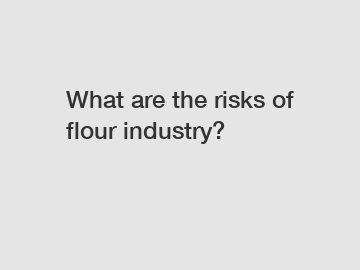Flour is a staple ingredient in countless recipes around the world. From baking bread and pastries to thickening sauces and making roux, flour is a versatile and essential ingredient in many dishes. However, the flour industry is not without its risks. In this blog post, we will explore some of the potential dangers and hazards associated with the flour industry.
One of the primary risks of the flour industry is the potential for contamination. Flour is a raw agricultural product that is processed in mills and factories before it reaches consumers. During the processing and packaging stages, there is a risk of contamination with harmful bacteria such as E. coli and Salmonella. These pathogens can cause foodborne illnesses and pose serious health risks to consumers. In recent years, there have been several high-profile recalls of flour products due to contamination, highlighting the importance of strict quality control measures in the industry.
Another risk of the flour industry is the potential for allergen cross-contamination. Many people have allergies or sensitivities to common allergens such as nuts, soy, and gluten. In facilities that process multiple types of flour and other ingredients, there is a risk of cross-contamination between allergens, leading to allergic reactions in sensitive individuals. Companies in the flour industry must take precautions to prevent cross-contamination and ensure that their products are safe for consumers with allergies.

The flour industry also faces risks related to worker safety and health. Working in a flour mill or factory can expose workers to hazards such as grain dust, which can cause respiratory issues and allergic reactions. In addition, the machinery used in flour processing can pose a risk of injury if not properly maintained and operated. Companies in the flour industry must prioritize worker safety and provide adequate training and protective equipment to prevent accidents and injuries in the workplace.
Environmental risks are another concern in the flour industry. The production of flour requires large amounts of water and energy, and the disposal of waste products such as bran and germ can have negative impacts on the environment. Additionally, the transportation of flour products to market can contribute to air pollution and greenhouse gas emissions. Companies in the flour industry must implement sustainable practices to minimize their environmental footprint and reduce their impact on the planet.
One of the biggest risks facing the flour industry today is the threat of economic instability. The price of wheat, the primary ingredient in flour, is subject to fluctuations in the global market due to factors such as weather conditions, supply and demand, and geopolitical events. Companies in the flour industry must navigate these uncertainties and adapt their business strategies to remain competitive and profitable in a volatile market. Economic instability can also impact consumers, leading to price increases and fluctuations in the availability of flour products.
In conclusion, the flour industry faces a variety of risks that can impact the safety of consumers, the health of workers, the sustainability of the environment, and the profitability of businesses. Companies in the flour industry must be proactive in identifying and mitigating these risks to ensure the quality and safety of their products, protect the well-being of their employees, and minimize their impact on the planet. By implementing strict quality control measures, promoting worker safety, adopting sustainable practices, and staying informed about market trends, companies in the flour industry can navigate the challenges and uncertainties that come with operating in this essential and versatile sector.
For more grains processing equipment, wheat flour processing plant, flour mill business for saleinformation, please contact us. We will provide professional answers.



Comments
All Comments (0)